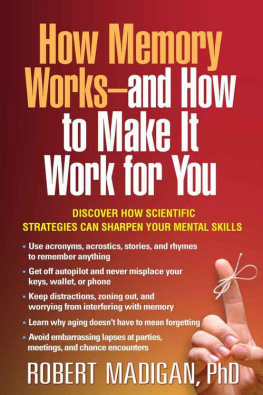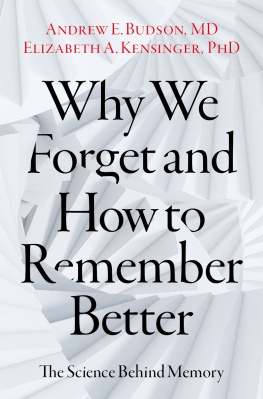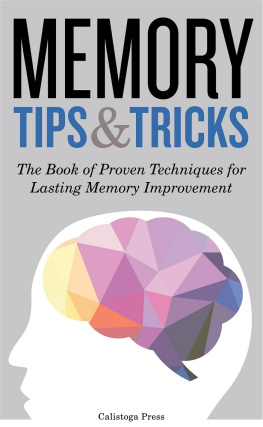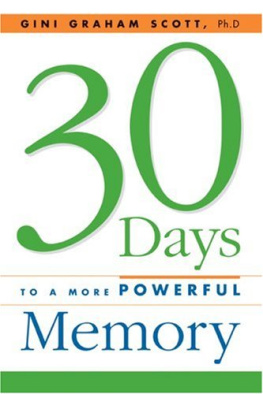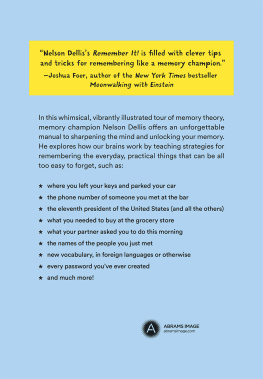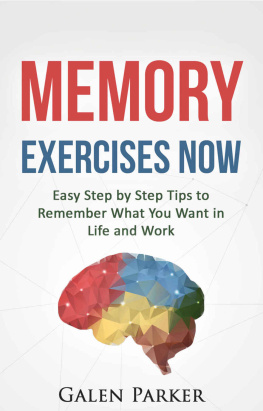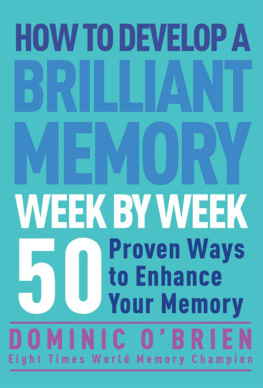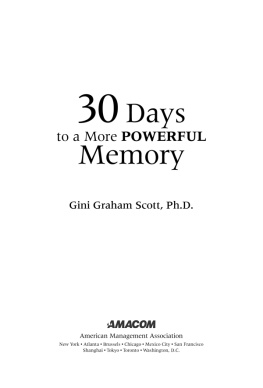How Memory Works
and How to Make It
Work for You
Robert Madigan, PhD

THE GUILFORD PRESS
New York London
Epub Edition ISBN: 9781462509256; Kindle Edition ISBN: 9781462511556
2015 The Guilford Press
A Division of Guilford Publications, Inc.
370 Seventh Avenue, Suite 1200, New York, NY 10001
www.guilford.com
All rights reserved
The information in this volume is not intended as a substitute for consultation with healthcare professionals. Each individuals health concerns should be evaluated by a qualified professional.
No part of this book may be reproduced, translated, stored in a retrieval system, or transmitted, in any form or by any means, electronic, mechanical, photocopying, microfilming, recording, or otherwise, without written permission from the publisher.
Last digit is print number: 9 8 7 6 5 4 3 2 1
Library of Congress Cataloging-in-Publication Data
Madigan, Robert.
How memory worksand how to make it work for you / Robert Madigan.
pages cm
Includes bibliographical references and index.
ISBN 978-1-4625-2037-4 (paperback) ISBN 978-1-4625-2038-1 (hardcover)
1. Mnemonics. 2. Memory. I. Title.
BF385.M26 2015
153.1'4dc23
2015007441
To Jodi, for your support all these many years
This book was a long time coming, and it would never have made it without the patient support of my wife, Jodi. She tolerated my being at the computer for long periods, and she was the first reader of much of the book. Many of its illustrations profited from her ideas and refinements. My good friend and former colleague Dick Bruce was another stalwart, always ready to look at yet another draft. I owe special thanks to Jo Ann Miller, the editor who helped me discover the book I really wanted to write and whose suggestions and input made every chapter better. Kivalina Grove improved several of the drawings. The folks at The Guilford Press were always helpful and easy to work with, especially Kitty Moore, Chris Benton, and Carolyn Graham. And finally, I thank the students from my memory classes for feedback on the various memory techniques, feedback that led to improvements and new applications. I offer them my best wishes for their futures.
Contents
The Art and Science of Memory
Have you ever wished you could better remember the names of people you just met? Or that tasks like paying the phone bill wouldnt so easily slip your mind? Can you imagine going to the supermarket without carrying a list? Or remembering the passwords for all your accounts? Do you wish you could recall more details of the great vacation you took last fall? It turns out that better memory in situations like these is within reach of most people if they practice the strategies of the memory arts.
In recent years science has made great strides in expanding our understanding of how memory works and how we can make it work better. In the pages that follow, you will read about fascinating new research that sheds light on the many facets of human memory. And you will learn about what I call the memory arts, strategies based on science but applied creatively to handle situationslike recalling a past event or remembering peoples nameswhere forgetting is likely.
You might ask why a book about memory improvement is needed in the age of Google, smartphones, and social media, when so much is literally at our fingertips. Its true that these revolutionary inventions have created a capacity for managing information unimaginable just a decade ago. Interestingly, though, the very power of technology has made improving our memory unexpectedly relevant and valuable. As we outsource more and more mentally challenging tasks to our electronic helpers, we can be left with a sense that important skills are eroding, a feeling that we are getting mentally out of shape. , a columnist on style and mens health, writing in GQ magazine in 2011:
I used to have all my vital statistics committed to memorybank account details, passport number, fake date of birth in case I got IDd. So what changed? I have become over-reliant on artificial memory, thats what. When I wake up, the first thing I do is check my electronic diary to see what appointments I have. When I get into my car, I tap the destination into the GPSId be lost without it. My writing is over-reliant on a computer spell check; mental arithmetic has given way to the calculator. I dont need to remember ye olde postal addresses when my webmail remembers everyones email for me.
found that a third of those under thirty could not remember their own phone number, and their memory for family birthdays was far worse. In fact, it would be surprising if this were not the case. Remembering information and appointments requires mental effort, and when a device will easily retain such information for us, why should we bother? Recall how dishwashers and clothes washers, power saws and gas-driven lawn mowers changed how much physical activity we got each day. There was a time when we didnt have to go to the gym to work out. But once labor-saving machines began to take over, we walked less, lifted less, moved less.
Twenty-first-century technology has its impact on mental tasks, not physical labor. Computerized devices and clever software allow us to do more intellectual work than we ever could without them and to do it faster and with relative ease. Whether you are a businessperson using an electronic spreadsheet, a scholar searching through massive databases, a physician relying on computerized records, or a writer dependent on your word processor, most of us would not want to go back to twentieth-century ways.
Indeed, these inventions have become our partners in mentally demanding activities. We count on them to take care of details, sequence tasks, and summarize information. We are so closely partnered with our devices that we become uncomfortable when we must drive to an address without the GPS, or write a letter without the computer, or calculate our taxes without specialized software. Thats when, like Rookwood, we start to wonder if something has gone out of balance.
The memory arts offer a way to reclaim some of this lost ground, to improve memory for specific materialremembering facts, numbers, names, events, and more. These strategies rely on initiative, ingenuity, and knowledge of memory principles to make easily forgotten material more memorable, and they do it without outside help. Using them is not unlike seeking out physical activity by deliberately walking rather than driving or taking the stairs rather than the elevator.
Sometimes memory strategies dont require much. If you are introduced to Brad, a new coworker, and want to remember his name, you could picture the actor Brad Pitt standing next to the new Brad, arm in arm. This brings into play two powerful memory aids, visualization and association. In the process, you activate high-level mental processes as you select a mnemonic approach, generate imagery, and create an association. Because this mental exercise is solely under your control and uses only your own mental resources, it is a counterbalance to dependency on computerized devices.
Memory strategies are more than mental exercise. They are practical, proven ways to improve our ability to retain and make use of valuable information. They help in situations where technological devices are least useful for managing information, situations such as remembering Brads name, remembering to pick up the dry cleaning on your way home, remembering facts for a business meeting, or retaining crucial passwords and PIN numbers. The mental effort and creativity they require is paid back by their usefulness in handling the demands of daily life.
Next page
